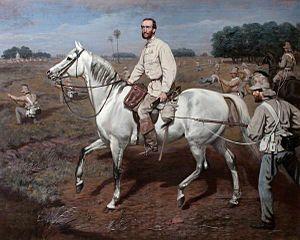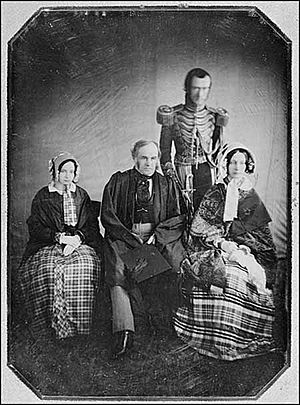Lord Mark Kerr (British Army officer, born 1817) facts for kids
Quick facts for kids
Lord Mark Kerr
|
|
|---|---|

General Lord Mark Kerr in India Kit, equestrian portrait by Charles Lutyens (1858)
|
|
| Born | 15 December 1817 Newbattle Abbey, Midlothian, Scotland |
| Died | 17 May 1900 (aged 82) London |
| Allegiance | |
| Service/ |
|
| Rank | General |
| Unit | 20th (East Devonshire) Regiment of Foot 13th (1st Somersetshire) (Prince Albert's Light Infantry) Regiment of Foot |
| Commands held | 13th (Prince Albert's Own) Regiment of Light Infantry Poona Division of the Bombay Army |
| Battles/wars | Crimean War Indian Rebellion |
| Awards | GCB, CB |
General Lord Mark Ralph George Kerr GCB (born 15 December 1817 – died 17 May 1900) was an important officer in the British Army. He fought in the Crimean War and served in India during a major uprising.
Contents
Early Life and Family
Lord Mark Kerr was born in Scotland in 1817. His family lived in a grand old home called Newbattle Abbey. His father was the 6th Marquess of Lothian. Mark was one of 12 children in his family.
Military Career
Lord Mark Kerr began his army career on 19 June 1835. He joined the 20th (East Devonshire) Regiment of Foot. He served in different places, including Bermuda and Canada, from 1842 to 1853. During these years, he slowly moved up the ranks.
Fighting in the Crimean War
In 1854, his regiment was in England. On 22 December 1854, he took command of the 13th (1st Somersetshire) (Prince Albert's Light Infantry) Regiment of Foot. He led them in the Crimean War, a big conflict fought between 1853 and 1856. He commanded his troops in important battles like Tchernaya and during the fall of Sebastopol in 1855.
Service in India
After the Crimean War, Lord Mark Kerr's regiment went to India. He commanded the 13th Light Infantry during the Indian Rebellion of 1857. This was a major uprising against British rule in India.
In 1858, he led a small force that won a big victory. They defeated much larger enemy forces at the Siege of Azimghur. For his bravery and leadership, he was given the Companion of the Order of the Bath (CB) award.
Rising Through the Ranks
Lord Mark Kerr continued to advance in his military career. He became a Brigadier-General in 1862. By 1868, he was promoted to Major-General. He later commanded the Poona Division of the Bombay Army in India in 1874.
He reached the rank of Lieutenant General in 1876. Finally, in 1878, he became a full General. He received even higher honors, becoming a Knight Commander of the Order of the Bath (KCB) in 1881. In 1893, he was made a Knight Grand Cross of the Order of the Bath (GCB).
Lord Mark Kerr also held special roles as a Regimental Colonel. He was the Colonel of the 54th Regiment of Foot and later of the Somerset Light Infantry. He held this last position until he passed away. His family had a long history with the 13th Light Infantry. Another Lord Mark Kerr had also been a colonel in the regiment many years before.
He wrote a journal about his experiences in the army and his travels.
Death
Lord Mark Kerr died in London in 1900. He never married.
See also
 | Leon Lynch |
 | Milton P. Webster |
 | Ferdinand Smith |


